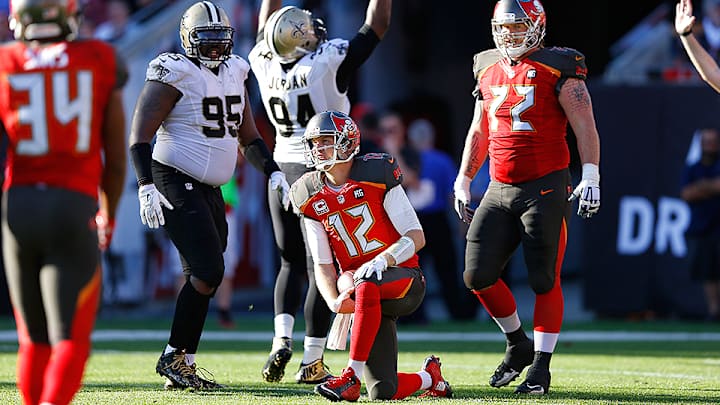Roundtable: Is it ever acceptable for teams to tank, and to what extent?

We've reached the second half of the 2015 NFL season, and it’s clear that some teams need to be already looking ahead to next year. Lose now, get a higher draft pick, select a better player, right? Well, not quite.
It’s not uncommon for teams to make decisions that, if not quite tanking, certainly don’t correspond with a win-now mentality. Under what conditions is it acceptable for NFL teams to increase their probability of losing? And to what extent is it OK for teams to tank in general? SI.com’s NFL staff discusses in this week’s roundtable.
• Double your money playing fantasy football on Sunday. Refunds for all losing teams! New users only. Sponsored by FanDuel

Don Banks
Tanking is such an ugly word. But whatever you want to call it, it's unacceptable in the NFL and a very weak act indeed. You play only 16 games a season, and to give one of them away on purpose is a bad look for the league, no matter how good the results might turn out for the offending team. Rest assured it does happen, and you don’t have to think back too far for a prime example. Last season, in Week 17, the Bucs curled up in the fetal position at home against the Saints, ensuring the defeat that awarded 2–14 Tampa Bay the No. 1 pick in the 2015 draft and a shot at either Jameis Winston or Marcus Mariota, the two top-rated quarterbacks. We know now who they wanted all along.
Week 10 picks: Cardinals, Seahawks square off in NFC West showdown
Up 20–7 at the start of the fourth quarter, the Bucs kept right on benching starters, a process that not-too-subtly began at halftime. Taking no chances, almost all of Tampa Bay’s key players were out of the lineup in the game’s final 15 minutes. Topping things off, the Bucs let quarterback Josh McCown throw only three passes in the second half, with the veteran absorbing a game-clinching sack for a safety behind an offensive line dotted with reserves. The Bucs were relentless in their surrender, and fell 23–20, despite having won their previous 24 regular-season games in which they held a lead of at least 13 points to begin the fourth quarter.
Bucs coach Lovie Smith wound up getting his guy in Winston, and perhaps history will vindicate a decision born out of Tampa Bay’s desperation for a franchise quarterback. But tanking away today in order to win in the future is still a maneuver that comes with a cost—at least in terms of some reputation lost.
Chris Burke
No. I get the argument from a practical sense—worse record equals higher pick equals, in theory, better player.
A couple of issues, though. Even entertaining the thought of “tanking” flows completely against the entire win-now culture of the NFL. How can you convince a GM or coach or player to wave the white flag when all of their jobs depend on performance?
There also is the little problem of assuming that merely holding an early draft pick will result in a great draft. We’ve seen time and again that is not necessarily the case. Better to win when you can, be it for a team’s mentality as it rebuilds or for the benefit of those hoping to earn jobs the following season.
Doug Farrar
You can’t tank. In 1968, the Eagles simply had to lose the rest of their games down the stretch for the right to the first draft pick, and the right to select O.J. Simpson. But they won two of their last three games, the Bills got Simpson, and the 2–12 Eagles selected Leroy Keyes with the third pick instead. The only historic thing Philly got out of that was when the fans booed Santa Claus, but I maintain that the Eagles did the right thing.
Ron Wolf talks Al Davis, Brett Favre and his Hall of Fame football life
Tanking the rest of your season for a better draft pick goes against the competitive mindset on which football is built, and many players will tell you that if you ease off on the field, it actually increases your chance of injury. There's no issue (nor should there be) with resting your best players if you have the division or a top seed wrapped up—but that's not tanking. That’s just saving your assets for the right time. But taking the field with the intention to lose in any way? How is that different than what the Black Sox did, and were later banned for doing? Intentionally losing is a betrayal of the game, and should not be endorsed under any circumstances.
Eric Single
Players and coaches have no incentive to act with anything beyond the current season in mind, but NFL front offices can’t possibly be above looking farther down the road at the value of a few extra losses once the playoffs are no longer in sight. Trading away the unwieldy contracts of veteran starters and putting injured players in bubble wrap can improve a bad team's prospects for next season even before factoring in the value of a more favorable position in the crapshoot that is the NFL draft.
Actions that fall under the broad net of tanking happen more rarely in the NFL than in any other major sport, in part because the season is so short and ridden with variance, but that brevity also makes the final month of a lost season a slightly less painful experience for those destined (doomed?) to stay connected with the team in the long term.
